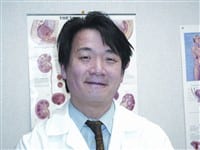A Quiet Gift Anonymous Donor Brings Digital Mammography to Noble Hospital
George Koller beamed with appreciation over the recent $1.75 million donation to Noble Hospital — even though he had no one to publicly beam at.
The anonymous donation, one of the largest in the facility’s history, will bring much-needed digital mammography to the campus.
“Like other businesses and hospitals, we have a five-year capital plan where we bring in certain equipment over time,” said Koller, Noble’s president and CEO. “One of our projects was bringing a digital mammography unit on board this year. That’s going to come out of these dollars.”
Koller wouldn’t reveal much information about the donor, but explained that he or she wanted to make a sizeable donation that could be put toward some specific purpose and quickly bear fruit.
“We talked about a couple of possibilities, but the mammography really piqued the interest of the donor,” he said. “They said, ‘gee, we would like to be able to help you with that. We’d like to provide that for the hospital.’ So $1 million of the gift was earmarked for the purchase of two digital mammography units.”
The remaining $750,000, he explained, will be placed in a permanent trust fund in Noble’s name. The principal will be restricted, but the hospital will receive an annual interest disbursement to use for whatever it deems appropriate.
“The model is straightforward,” Koller told The Healthcare News, “but the gift is very unusual — and very much appreciated.”
State of the Art
Digital mammography takes an electronic image of the breast and stores it directly in a computer, although it can also be printed on film. Unlike traditional film-only images, however, digital mammograms allow the image to be enhanced, magnified, or manipulated for further evaluation.
A study released roughly 18 months ago by the National Cancer Institute (NCI) shows little difference between film and digital mammography in detecting breast cancer in the general population.
However, it revealed that digital images may be a superior tool in women younger than age 50, those who are pre- or perimenopausal, and women with dense breasts — a high-risk group for breast cancer, and one in which the sensitivity of film mammography is somewhat limited.
“This digital mammography study demonstrates how new technologies are expanding our ability to detect breast cancer earlier in more women,” NCI Director Dr. Andrew von Eschenbach said at the time.
“These results will give clinicians better guidance and greater choice in deciding which women would benefit most from various forms of mammography,” added the study’s senior author, Dr. Etta Pisano.
Koller said digital mammography is a no-brainer for a hospital that touts its Women’s Center as one of its core services. Late last year, Noble further emphasized that area of care by launching a monthly breast clinic at which women can not only undergo mammograms, but also biopsies and other tests, if necessary, right on the spot.
Koller noted, too, that hospitals need to be quicker than in the past to implement breakthrough technologies, as patients’ self-education about health care has never been at a higher level.
“This is a cutting-edge tool,” he said. “People across the country are much more educated on these things, and many of them are actually requesting digital mammography when they come in. People in this community want it, and we’re just delighted to be able to provide it.”
Giving Back
When Judge John Greaney, outgoing chairman of Noble’s board, announced the anonymous gift, he described the donor as an area resident with a longstanding relationship with the hospital.
“This is a magnificent gift that has significance not only for the future of Noble Hospital, but also for our community,” Greaney said. “This is the essence of philanthropy. Here we have a donor who is grateful for the care provided by the hospital, and selects this extraordinary manner by which to express his gratitude.”
Koller said hospital officials were surprised at the gift, but thankful for any opportunity to move the Women’s Center — and, indeed, quality of care throughout the Noble campus — further into the 21st century.
“I look forward to the day when we will have the opportunity to publicly express our appreciation in a manner that reflects the impact of a gift of this magnitude,” he said. “This gesture speaks not only to the appreciation the donor has for the hospital on a personal basis, but also reflects a true concern for the well-being of this community.”

